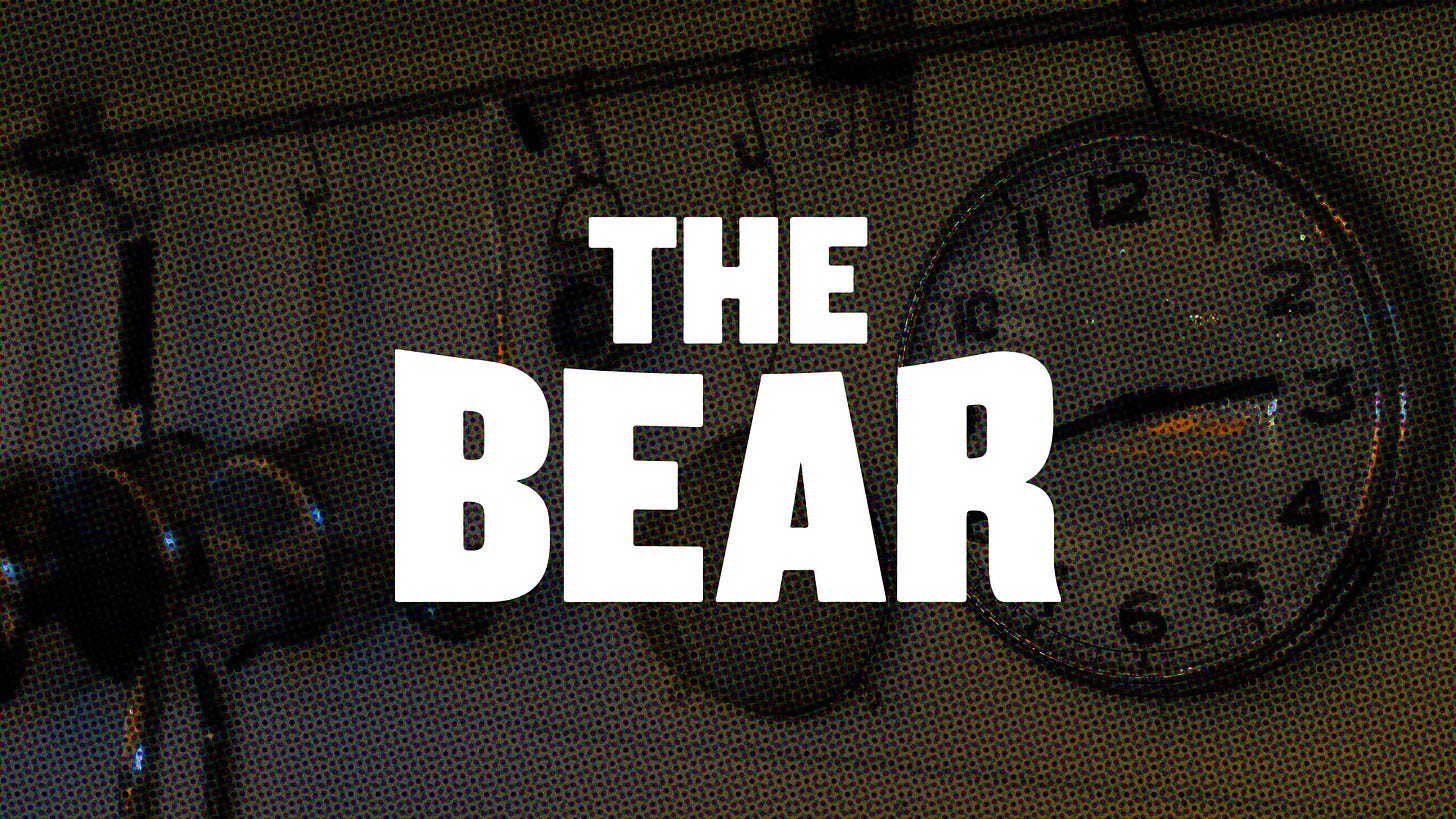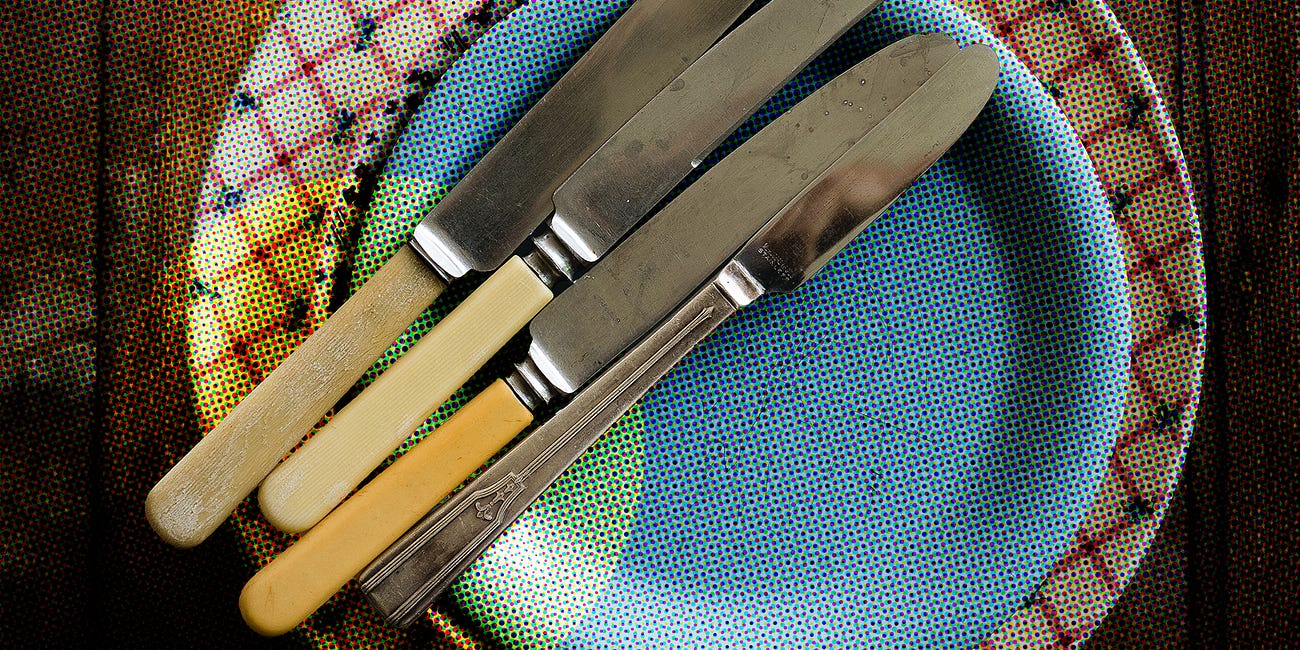Radio might be the most intimate medium but TV is the most sociable; a convivial presence in every living room we’ve ever known, ready with gossip, information, comfort or distraction. In The Friend in the Corner we return to significant TV shows to find out what they did for us, and how they pulled it off.
Friend in the corner: The Bear
Amuse bouche
Following the suicide of his charismatic older brother Michael, Michelin star winning chef Carmen Berzatto inherits the family sandwich shop and, with the help of star-struck apprentice Sydney Adamu, sets about trying to turn it into a fashionable restaurant, The Bear, much to the frustration of current staff including seething ball of anger Tina, conflict refugee Ebraheim and most of all boorish would-be-alpha-male Cousin Richie.
The Bear is billed as a ‘comedy/drama’ but it’s initially not clear where the laughs are coming from. Grief, anger, interpersonal friction, knives and guns: yes. Jokes? Not so much. Despite sharing a set up with ‘90s Lenny Henry vehicle Chef! (in which Henry’s culinary genius Gareth Blackstock sets about bullying his kitchen staff into saving a failing restaurant), The Bear is very definitely not a sitcom.
The ‘comedy’ label appears to have been adopted as a kind of neoteny, the process by which adult domestic pets retain juvenile features and so end up looking more like puppies and kittens than wolves and tigers. The Bear is a drama, but not a drama. You are not going to be expected to sit through harrowing depictions of sexual violence, agonising descents into addiction or long sequences of gloomy bourgeois parents have quiet breakdowns in unlit kitchens and chunky knitwear. There’s emotional, financial and culinary dysfunction, but you can feel safe knowing that nobody will sexually harass Sydney, and that Marcus is not going to meet a single racist while he’s in Denmark. Like beef sandwiches, it is comforting to consume.
It helps that it is incredibly well made. You most likely haven’t heard of Chef! - I doubt Lenny Henry even remembers it - but it’s a decent sitcom of its period; it even has some actually funny jokes, which is rarer than one would like. But it is of its period. It has a kitchen set with a camera in the fourth wall, a background cast of one note characters, and a lot of broad ‘comic’ performances. 30 years later, even an apparently run-of-the-mill show like The Bear is extraordinarily well written and directed. It also has a brilliant soundtrack, although I bring this up to have an excuse to tell you that every piece of music used was already on my Spotify playlist.
This is modern American TV, where all the performances are like something out of golden age New Hollywood cinema, all effortless naturalism and pin point characterisation. This style is particularly noticeable when Olivia Colman pops up in a cameo in Season Two and doesn’t do it. Which is not to say she can’t do acting - this is Olivia Colman, after all, she’s generally considered quite good at it - both she and Ebon Moss-Bachrach as Richie are extraordinary in the scene, but they’re subtly distinctive in their performances. It’s partly in the characters, of course, her Chef Terry is in a position of power in her own kitchen compared to Richie, but it’s also, one suspects, simply a difference in cultural temperaments, between American self-expression and British emotional repression; a different style, a different taste.
Hors d'oeuvres
The kitchen is a metaphor, of course; a big, hot metaphor full of knives, flames and delicious ironies. Key to that metaphor is the system of the commercial kitchen: the intricate hierarchy of roles, the insistent ticking of the tasks, the shouts of ‘corner!’ and ‘behind!’ as they move around, the uniforms and equipment and ingredients.
This system is the cage in which Carmen keeps ‘the bear’, which is his grief1: his fear and anger and primal hurt. Although it is wild, it is trapped by ritual and purpose. (Everyone calls Carmen ‘Carm’, which to English ears sounds like ‘calm’.) Jeremy Allen White’s face looks like a Renaissance statue, but it's stucco on a rotten wooden frame, the impassive front to a seething maelstrom. The kitchen gives Carmen the space in which to be stressed and stressful, emotional and controlled. Appropriately enough <spoilers> Season 2 ends with him finally cornered in the kitchen, locked in the cold store having a meltdown, caught in a trap that he thought was a defence.
But the bars of the cage are also scaffolding. The system of a commercial kitchen also enables communal work; it is set up to maximise people’s ability to build together productively. It gives people spaces and roles in which to grow and develop. It provides the constraints that allow creativity.
Main Course
Early on in Chef!, Lenny Henry’s Gareth Blackstock overhears a diner in his restaurant asking for salt. He launches into a scathing and impassioned diatribe, browbeating the customer with his knowledge, skill and derision. When he has finally stormed off the maitre d’ tries to placate the customer: ‘You must try and look at him as an artist, rather than a rude and overbearing megalomaniac.’
The Bear is a riposte: not just to this bullying, arrogant, snobbish idea of cooking, but also the Romantic idea of the lone, bohemian genius whose art doesn’t so much outweigh his failings as necessitate them. It suggests the restaurant kitchen as a place of communal creation, as all art is, or should be. It places the auteur back within the team, acknowledging the system that supports the creation.
In the Lenny Henry series the cry of ‘Chef!’ is a terrifying, magical invocation to placate the monster; in The Bear it becomes a mark of mutual respect. Everyone is referred to as ‘Chef’, because they are all integral to the process. In Chef! Blackstock is relentlessly disparaging to the wait staff, but when The Bear’s Cousin Richie is sent for some training at a high-end restaurant, he learns that running a dining room is an art in itself. He had thought of himself as a man without purpose, someone who was merely ‘good with people’, but discovers that this overlooked skill is a crucial component in the restaurant’s production of happiness.
The kitchen in The Bear has no time for the snobbishness of ‘90s-style fine dining; its job is to produce sensory and emotional experiences for joyful consumption, and it takes customer service as seriously as it takes the food. (It’s just a shame that the artful food produced by the revamped restaurant in Season 2 looks so much less appetising than the beef sandwiches they were making before.) While both The Bear and Chef! see high-end cooking as a form of art, The Bear sees this art as an ephemeral and, more importantly, commercial art, driven by the customer’s enjoyment. At Cousin Richie’s fancy training berth we see how determined the staff are to spoil their customers, in one case surprising a pizza-mad diner with an off-menu Chicago deep-dish pizza. This is a deeply American conception of luxury, available to anyone who can pay for it.
Just desserts
The whole of Season 2 of The Bear is a kind of mise en place for the opening night of the eponymous restaurant. The ingredients/characters are being prepared, and one by one we see them grow and discover new purpose. Here The Bear chimes with other recent shows such as Ted Lasso and Stranger Things, carefully making space for individual redemption through a communal endeavour: getting promoted to the Premier League, fighting extra-dimensional demons, making pastry. Cousin Richie’s dysfunction is revealed to be the result of his toxically masculine response to his divorce and his perceived lack of identity. The system and the communal support of the kitchen give him the space to learn and to grow, to redeem himself, to feel purposeful and become a broader person.
At Ever, the high-end restaurant where Richie does his training, there’s a motto on the wall of the kitchen: ‘Every Second Counts’. At first we assume that this is the implacable exhortation of a Gareth Blackstock, and that it refers to the frenetic, barely controlled panic of the restaurant service: the relentless ticking of clocks, pan lids, orders, the high-pitched seething of ‘New Noise’ by Refused on the soundtrack. But then we meet Olivia Colman’s Chef Terry, and through a personal story that she shares with Richie we realise it is not a command to hurry up; it is a reminder to slow down, to savour every moment.
In the town museum in Ilfracombe, Devon - which is the best museum in the world - there is a cabinet full of slices of Victorian wedding cake. The weddings for which they were baked are long gone, as are the marriages and the couples. Only the food remains, the crumbling evidence of love and connection. It has to be said that most food is more ephemeral than Victorian wedding cake (God knows what they put in it). Most food goes cold, goes off, goes into the stomach of the eaters; goes, eventually, into the sewers, revolting and poisonous.
The Bear holds two ideas in balance. Even in the midst of life we are in death; change and entropy are inevitable. But within that entropy, humans make communal experiences and memories that nourish the individual and the group. In the end, this is the only magnificent stand we can make.
Every Second Counts
For more discomfort food:
The pig that’s our anger?





Great, now I’m recalling the Christmas Dinner episode in season 2 and my blood pressure has spiked again
Really enjoyed this - and it’s actually made me start watching The Bear which has been on my radar for while but I’ve never got around to!